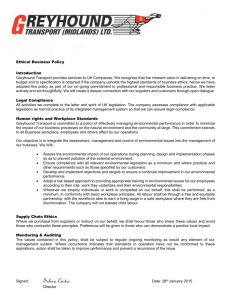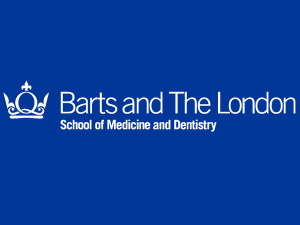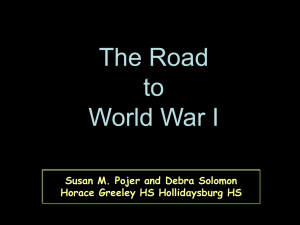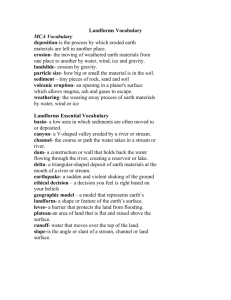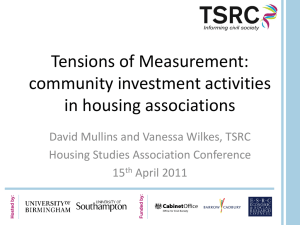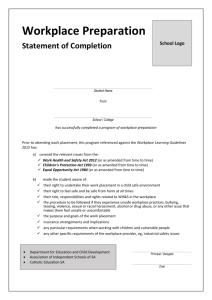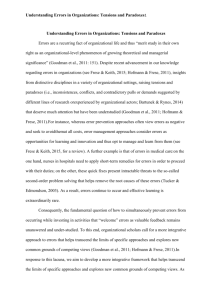More details
advertisement
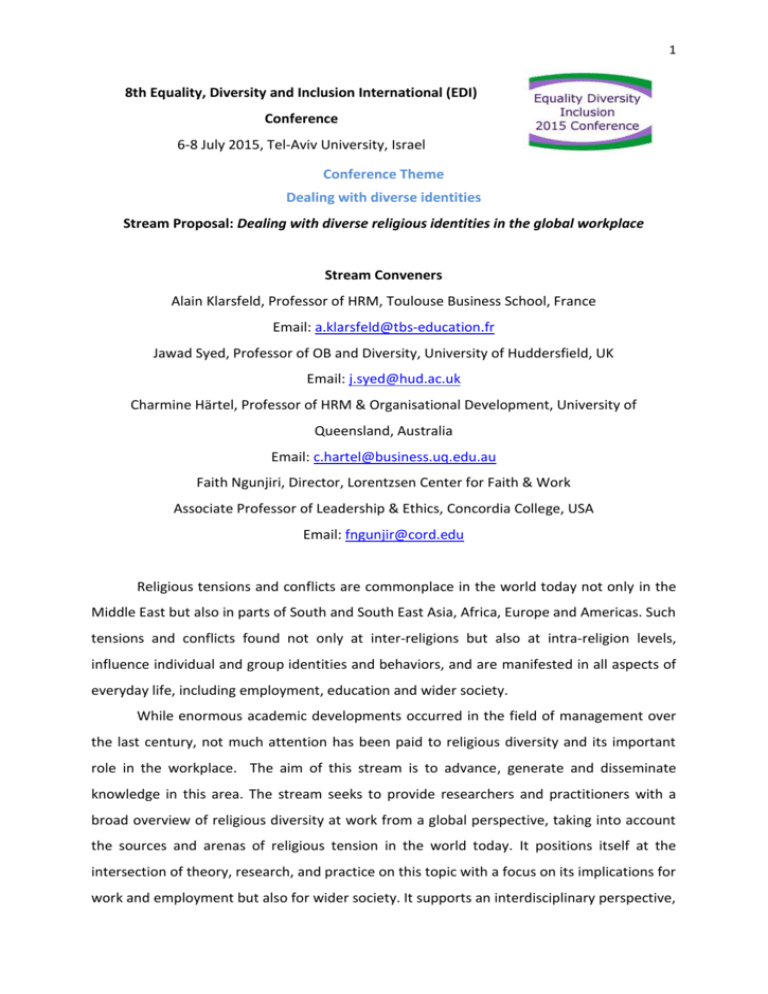
1 8th Equality, Diversity and Inclusion International (EDI) Conference 6-8 July 2015, Tel-Aviv University, Israel Conference Theme Dealing with diverse identities Stream Proposal: Dealing with diverse religious identities in the global workplace Stream Conveners Alain Klarsfeld, Professor of HRM, Toulouse Business School, France Email: a.klarsfeld@tbs-education.fr Jawad Syed, Professor of OB and Diversity, University of Huddersfield, UK Email: j.syed@hud.ac.uk Charmine Härtel, Professor of HRM & Organisational Development, University of Queensland, Australia Email: c.hartel@business.uq.edu.au Faith Ngunjiri, Director, Lorentzsen Center for Faith & Work Associate Professor of Leadership & Ethics, Concordia College, USA Email: fngunjir@cord.edu Religious tensions and conflicts are commonplace in the world today not only in the Middle East but also in parts of South and South East Asia, Africa, Europe and Americas. Such tensions and conflicts found not only at inter-religions but also at intra-religion levels, influence individual and group identities and behaviors, and are manifested in all aspects of everyday life, including employment, education and wider society. While enormous academic developments occurred in the field of management over the last century, not much attention has been paid to religious diversity and its important role in the workplace. The aim of this stream is to advance, generate and disseminate knowledge in this area. The stream seeks to provide researchers and practitioners with a broad overview of religious diversity at work from a global perspective, taking into account the sources and arenas of religious tension in the world today. It positions itself at the intersection of theory, research, and practice on this topic with a focus on its implications for work and employment but also for wider society. It supports an interdisciplinary perspective, 2 integrating contributions and insights from management, economics, politics, law, sociology, psychology, and religion. It also features forward-looking essays from thought leaders and practitioners in the field. In the light of recent high-profile religion-based conflicts (e.g. the Israel-Palestine conflict, the rise of the so called “Islamic State” in Iraq and Syria, the US invasion of Iraq, the emergence of radical Islamism as well as Islamophobia and antisemitism), there is a need to more deeply examine how faith-based tensions impact people, work, employment and organisations. For example, to what extent do such tensions result in blatant or refined workplace discrimination or hostility? To what extent do organisations/countries maintain silence on this topic? How does it impact individual and team performance and productivity in the workplace? What is needed for more transparent approaches to religion and religionbased tensions? To what extent do organizations/countries impede, tolerate, welcome, facilitate the expression of religious faith? To what extent may organizational practices create a culture of inclusion and cooperation? In addition to the above, the following is a non-exhaustive list of some possible topics: 1. Forms and expression of religious identity at work and implications for individuals and organisations 2. Silencing or tabooing of religious identity at work 3. Intersectionality of religion, ethnicity, gender, and other forms of identity at work 4. Organisational approaches to religious diversity in the workplace 5. Nature of religion-based tensions in the workplace and its impact on firm and individual performance 6. Implication of political conflicts in domestic or foreign societies for human resource management and development 7. Hate speech, stereotyping and othering of religious minorities and implications for work. 8. What makes people work together despite religion-based tensions? How does or can work bring them together? 9. Religion-based tensions and differences as an opportunity for dialogue, mutual discovery/understanding, and respect. 3 10. Similarities and differences in work ethics of Abrahamic and non-Abrahamic religions. 11. Alternative approaches to religious harmony and integration at work. Stream keywords: Diversity, faith, religion, spirituality. Note: We welcome all types of theoretical or empirical contributions to this stream. Contributions to the stream are eligible for submission to the “Religious diversity in the workplace: Conflict, harmony and performance”, a research book co-edited by Jawad Syed, Alain Klarsfeld, Charmine Härtel and Faith Ngunjiri. Important dates: Abstract/Developmental/full paper submission: March 1, 2015 on: http://www.edi-conference.org Response to authors (acceptance / rejection): April 15, 2015. Deadline for full papers and best paper nominations and submission of best papers to the relevant associated journal (as agreed by submitter): May 18, 2015.


